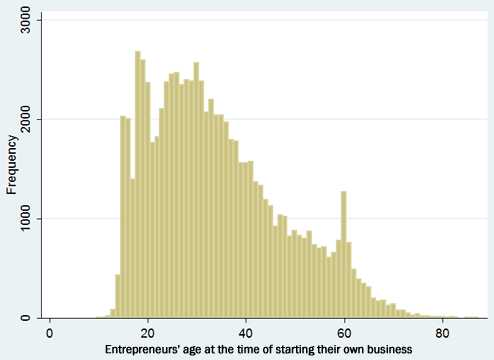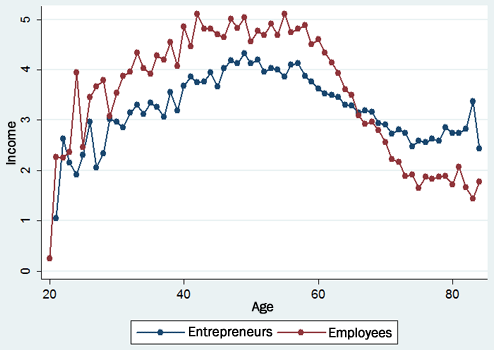Is entrepreneurship a privilege reserved for the young?
People tend to consider entrepreneurship as a privilege reserved exclusively for the young. Hiroshi Mikitani was 31 years old when he started up Rakuten, Inc., while Shigenomu Nagamori founded Nidec Corporation at the age of 28.
However, a review of data reveals otherwise. The average age of Japanese entrepreneurs who started up their business in 2013 was 42.1 years old, approximately three years older than it was 20 years ago. Furthermore, the proportion of those 50 years old or above has been on the rise as shown in Figure 1 (Japan Finance Corporation 2014). Thus, entrepreneurship is not necessarily a privilege reserved for the young.

[Click to enlarge]
Furthermore, Figure 2 shows that while those starting their own business in their 20s and 30s are the largest in number, those around age 60 represent—albeit, smaller—the peak.

Economic model of entrepreneurship
How can the relationship between entrepreneurship and age be explained in economics? Lévesque & Minniti (2006) proposed a model of a utility function which can be optimized by age. The function is composed from income earned by running a business or working for others and benefits derived from leisure activities
According to Lévesque et al., individuals choose between starting their own business and working for others by comparing how much they would be able to earn as a result of each choice, given their age at the time. In doing so, they would calculate the present value of their expected future income. Thus, starting a business at a higher age means a lower amount of expected cumulative future income, which leads to the conclusion that senior entrepreneurship would not pay off.
Is that true? Let's take a look at another set of data on entrepreneurial activities in Japan.
Entrepreneurship in Japan and changes in income
Figure 3, in which the horizontal axis represents age and the vertical axis measures income, plots the average annual income by age for entrepreneurs (Note) and employees. The blue line is for entrepreneurs and the red line for employees. We can see that the average annual income for entrepreneurs is lower than that for employees from ages 20 to around 65. However, the income gap begins to shrink after age 50. The average income for entrepreneurs outstrips that for employees when they reach around age 65, and the gap gradually expands thereafter.

Figure 3 provides a good picture of a typical income structure and employment patterns in Japan, showing that employees see their income plateau after age 50 followed by a significant decrease in income at age 65. What is important here, however, is that the longer they continue to work, the more income the entrepreneurs will be able to earn relative to their employed counterparts. There is no retirement age for entrepreneurs. If they can continue to work into old age, their decision to start a business will pay off.
Although more precise calculations should be made separately, a review of the graph suggests that those who start their own business at age 55 would be able to make up for the decrease in income in the initial years if they continue to work until around age 70. Furthermore, if we assume that people work until age 75, the amount of expected cumulative future income for those who start a business at age 50 is same as that for those who do not.
What should be noted here is that the average annual income for employees in the graph is the average annual income for those with jobs. That is, the average annual income for employees age 65 or above is not pension income but wage income earned by some form of employment. Given the current reality of Japan's labor market where there is little demand for workers age 60 or above, employees inevitably experience a sharp drop in income after age 60. In contrast, entrepreneurs' income after age 60 follows a relatively gentle downward slope, unaffected by retirement age and supply-demand conditions in the labor market.
Senior entrepreneur model
Furthermore, income is not the only incentive for starting a business. Based on income data in the United States and Japan, Hamilton (2000) and Okamura & Ikeuchi (2014) note that the choice of starting a business cannot be fully explained without taking non-pecuniary benefits into account. Some people choose to start their own business because they want to utilize their skills or set their own schedule. Those incentives also affect entrepreneurial activities by seniors.
Entrepreneurship is not a privilege exclusively reserved for the youth. Going forward, it is hoped that elderly people—those who are filled with energy and passion—will play an active role as entrepreneurs, along with their younger peers, by taking advantage of their seasoned experience. By setting a successful example in Japan, a country that is most advanced in terms of population aging, those entrepreneurs may become a model for their peers in other countries.


